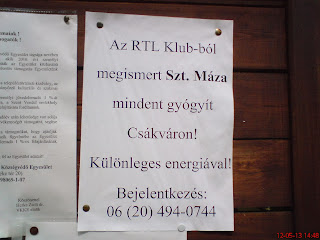I was
threatened with a gun twice in my life. First, when I visited my
parents' house in 1998, I went for a walk with one of my friends. I
had just been about to leave for Budapest, and I decided to take a
walk before sitting on the bus for two hours. I just went to a near
place, where there was a little pine wood. I knew that place well, as
there stood the kindergarten what I attended as a child.
A soldier
with a gun ran towards us, shouting we should stop. We stopped, and
we were captured. He informed us that the site belonged to the
Hungarian Army, and we were forbidden from the territory. Otherwise,
there was not any sign or barrier which said it was a restricted
area, and it was in the town, between two residential areas, from 15
minutes walk from downtown. We didn't have an identity card with us,
so were unable to satisfy his require for justifying our address. But
it would be in vain as my parents were those who were inhabitants of
that town, and not me.
As the
soldier kept threatening us with the gun, I was forced to believe
that he is a real soldier. He accompanied us to a watch tower, and
ordered us to knee. Meanwhile it was raining slightly, and I asked
him if he could refrain from this. He told me this is the rule.
– I am a
sharpshooter, you are lucky you stopped. Anyway, I was not on a
holiday for ages, I think I will get some days for you. Okay, stay
standing, but show a really intimidated face when the patrol arrives.
Then he
marched up to the watch tower to make a phone call. In ten minutes a
patrol arrived and we couldn't give them any more information about
ourselves that we had already given to our soldier, that we were
walking around here because here stood my former kindergarten. They
knew this was true, there was a kindergarten here in the 80's. They
ordered us to go forward and leave the restricted area with their
accompaniment. We got the civil town in 3 minutes and they let us
free. I took my bus to Budapest in time.
What was
this eager presence of army in such an insignificant town for?
Inhabitants guess the gold holdings of the country is kept in this
town, in a natural cave inside a rock. As for me, I don't think any
country can be so stupid to store it's whole golden property in a
single place. And I would be surprised if my country still had any
significant gold holdings remain. I guess the state owns some
valuable artifacts, but, honestly, I wouldn't be even slightly
surprised if they had been already sold including the Hungarian
Crown, and merely a fake one would be displayed. Anyway, my country
is usually careless about artifacts and artists. Gedeon Gerlóczy,
who rescued the works of the painter genius, Csontváry Kosztka
Tivadar, from being sold as cart covers, told that after he had lent
the Hungarian state some of Csontváry's paintings for an
exhibition, the pictures were never returned to him.
The
presence of the Soviet Army was also strong in the town when I was a
young girl. As we lived quite close to the barrack of “Russian
soldiers” (as we called them), my grandmother never let me go alone
anywhere, because she had a fear I would be raped. She strongly
taught me to run away immediately if I saw a Russian soldier. She
herself took much more risk. If some Russian soldiers approached her
house, she immediately locked the garden gate, shouted them 'Go
home!' in Russian. She completed this vocal action with threatening
the soldiers with a hoe or rake she just had in hand, or throwing a
stone towards them. Then she rushed into the house and locked the
door. She was the wife of a revolutionist, and she could never forget
the Soviet Army ruined the Revolution of in 1956. She was not a woman
of theories. She simply was angry because she felt sorry for his
husband's achievements, and hated to have been under terror and
having been chased for almost all of her life.











